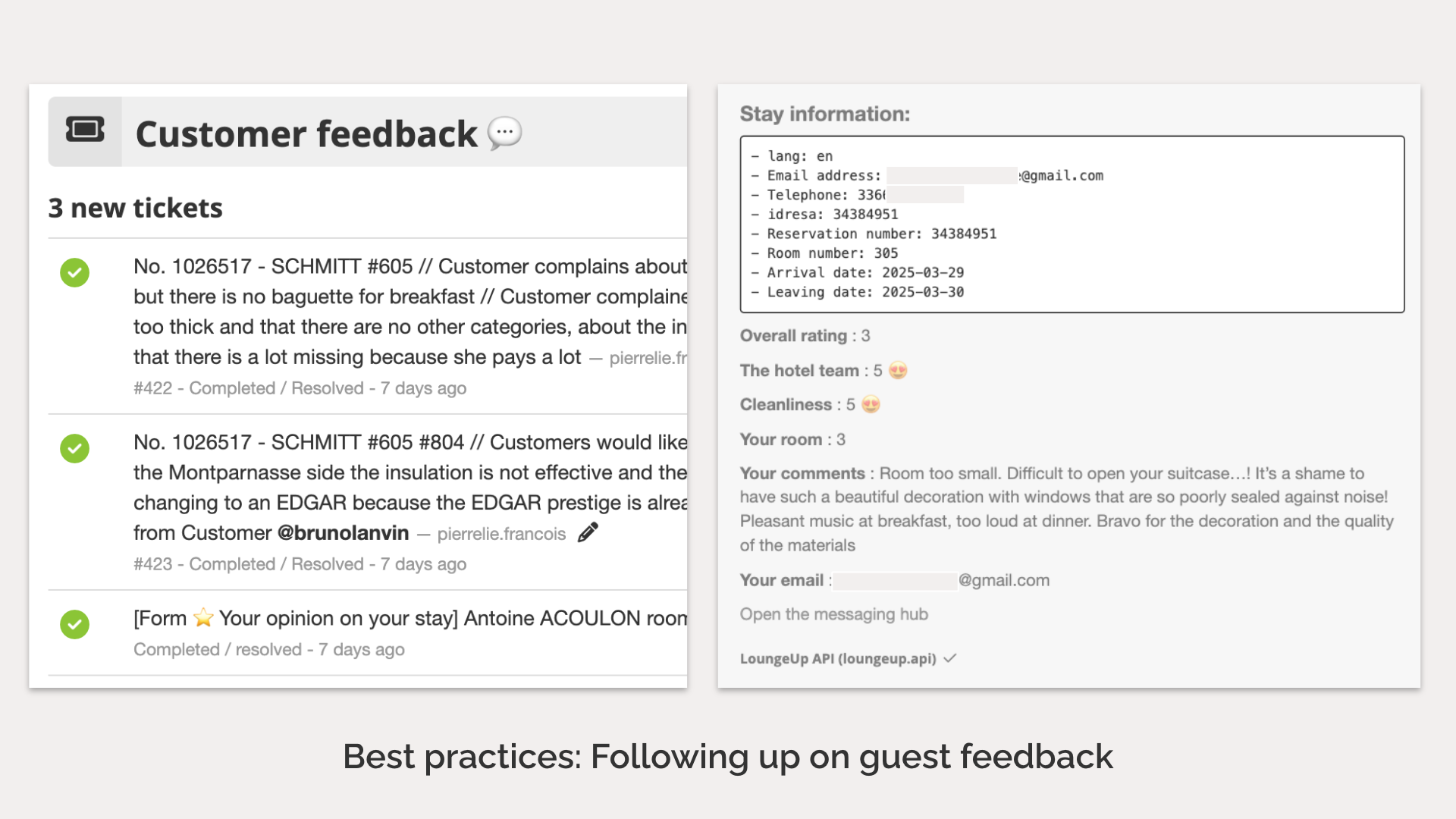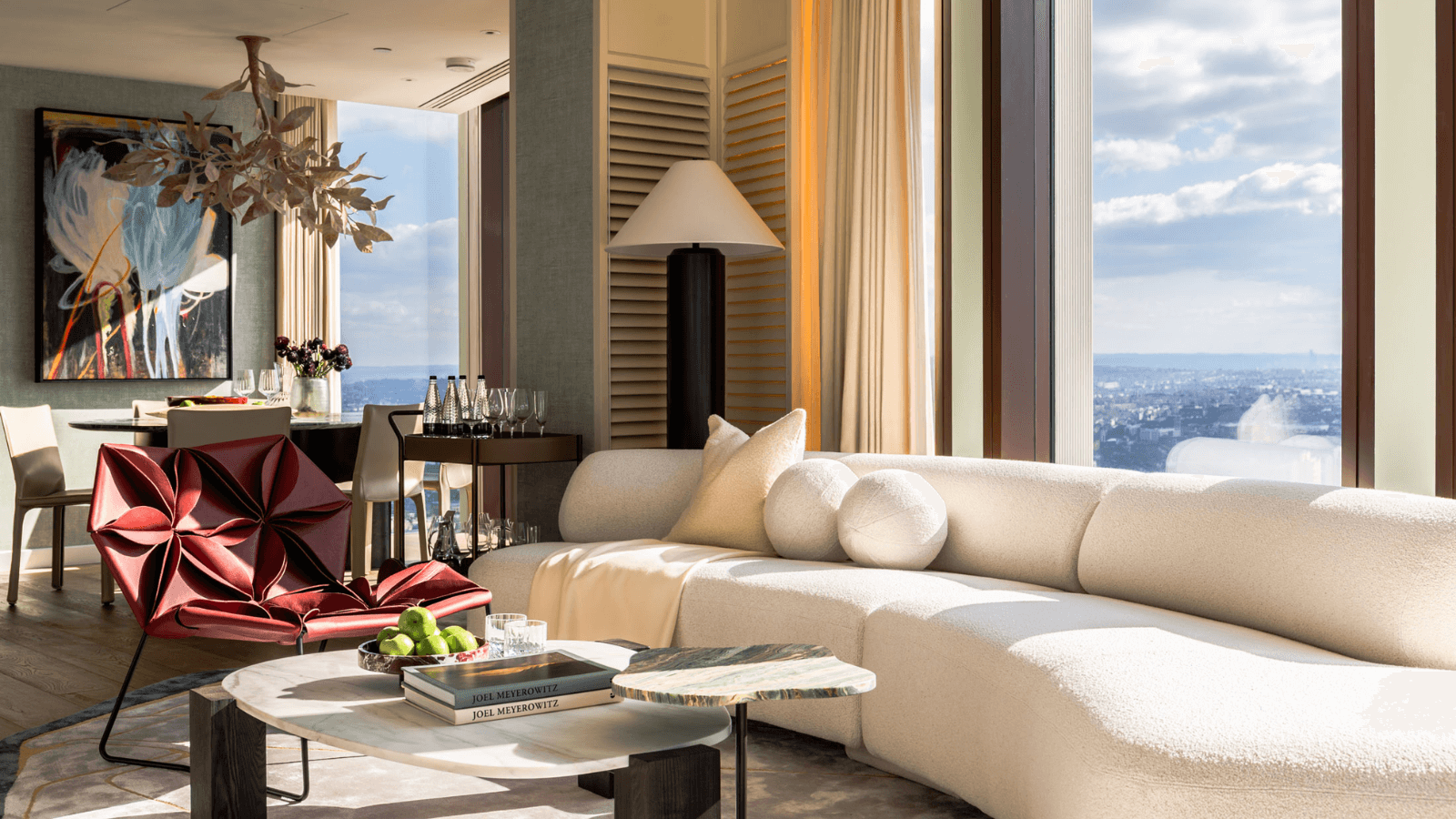

[Webinar ▶️] Hotelier's Insights: Technology to streamline operations and enhance the guest experience
How can a CRM, AI and task management tool transform the guest experience and streamline operations?
Discover the best practices of a 4-star hotel manager to optimise the work of his teams, improve internal communication and personalise the guest experience.
Speakers:
- Mathieu Pollet, Co-founder and Executive Director of LoungeUp
- Bruno Lanvin, Manager, Hotel Les Artistes
Les Artistes hotel presentation

The hotel Les Artistes is a boutique lifestyle hotel located near the Gare Montparnasse in Paris. With 45 rooms, an attached restaurant (Papalito), and a fitness room, the hotel is distinguished by its artistic ambience inspired by the great names of literature and painting. Each room is unique, with an artistic touch that recalls the rich history of this Parisian neighbourhood. The hotel opened in 2024 and quickly gained popularity for its meticulous design and personalised service.
Hotel features
Les Artistes, with its human-scale approach, benefits from its proximity to the Montparnasse train station, which leads to a high number of one-night stays and last-minute bookings. This demands rigorous internal organisation and operational efficiency.
The hotel's Tech Stack
- PMS (Property Management System) : Misterbooking
- CRM : LoungeUp
- Internal operations management: Dmbook
- AI: ChatGPT, Dust
- Channel Manager, Booking Engine: D-EDGE
- Website: MMCréation, Marketing on the site: Userguest
- Payment: Ogone Worldline
- Wi-fi: Passman, Telephony: Ipéfix
- Restaurant : Lightspeed and OverFull
- Locks: Salto
- Lost and found management: PeeK'In
- Team management : Skello
- Visual design: Canva
CRM best practices to personalise and facilitate the guest experience
The importance of respecting brand identity

The hotel has a strong graphic identity, inspired by art and literature, echoing the origins of the surrounding area. Each room bears the name of a great artist: Simone (de Beauvoir), André (Malraux), Edgar (Degas)...
To offer an immersive guest experience, the visual identity must remain consistent across all digital media. This involves graphic elements reminiscent of the brushstrokes visible in the rooms, as well as an artistic lexical field in the Guest App such as "itinerary sketches" for transport, "weather fresco", or "Parisian canvas" for the interactive map.
Pre-stay e-mail
The pre-stay campaign was written in collaboration with the hotel team and with the help of AI, to deliver a clean design and an authentic message. The objective: to give the impression that the e-mail comes directly from the Director, even though it is automated. Signed by Bruno Lanvin and accompanied by his photo, the e-mail strengthens the bond with guests, who then recognise him when they arrive at the hotel.
These campaigns play a key role in the guest experience. They enable guests to anticipate their arrival, understand the reasons for their stay and ask questions to personalise their welcome. Thanks to this automation, the hotel can collect this information on a large scale, as it is sent to all guests.
This data is then used to intelligently and automatically adapt the services offered and optimise the upsell. For example, if a guest indicates that he or she is arriving by train or plane, a private transfer is suggested, a service particularly appreciated by foreign visitors. Similarly, upgrade offers, such as a room with a view of the Eiffel Tower, can be highlighted according to the guest's preferences.

Arrival procedures
Automated WhatsApp messages

WhatsApp campaigns have transformed the hotel's communications, automatically sending a message to every guest whose phone number is linked to a WhatsApp account.
A good practice is to send an open question prior to arrival, inviting the guest to share information about their stay. Even if the guest only responds on their way to the hotel, the teams are warned in advance and can better organise themselves. This communication channel remains open throughout the stay, facilitating exchanges and reducing the load on the telephone line.
Registration form

The registration form can be completed and signed prior to arrival, directly on the guest's phone during the journey, or on the tablet at reception. To simplify the process, the form is pre-filled with information already known by the guest.
The date of birth is requested, but is optional. The receptionist informs the guest while asking if they would like to receive a birthday message from the hotel.
This dematerialisation and the combination of a pre-stay itinerary and the tablet on arrival present a major advantage for the hotel: they enable the collection of 100% of guests' personal email addresses. This serves as a powerful tool for the marketing team, allowing them to carry out more targeted and effective loyalty campaigns.
Exceptional situations

The flexibility of campaigns allows the hotel to be highly responsive in exceptional situations, such as air conditioning breaking down in summer or transportation and sightseeing conditions during the 2024 Olympic Games.Thanks to targeting by room type and dates of stay, affected guests are informed in advance, even before encountering the issue.
"We'd rather you were happy elsewhere than unhappy here"
- Bruno Lanvin
Anticipating potential dissatisfaction by communicating proactively sends a strong message: the hotel prioritises the comfort and expectations of its guests, leaving them the choice in complete transparency. This approach is particularly well-received, as it demonstrates a genuine concern for their satisfaction.
This anticipation also lightens the load on the front desk, which doesn't have to deal with an influx of unexpected complaints. By giving guests a choice, the hotel avoided negative online reviews, which could have permanently damaged its reputation for a temporary problem.
Welcoming VIP guests
It was necessary to filter the guest database to determine the different levels of VIP guests, in order to develop a tailor-made welcome strategy. This made it possible to define the services and gifts associated with each level, taking into account the cost generated in relation to the number of corresponding guests in recent months.
Whether it's a box of chocolates or a bottle of champagne, this segmentation makes it possible to precisely target each level of VIP guest, and thus structure the welcome strategy in the best possible way.
The Guest App
Accessible via a QR code or the hotel's wifi, the Guest App reflects the hotel's identity and highlights its services, as well as its team members. A tablet at reception enables receptionists to guide guests directly into the app, showing them where to find all the local recommendations.
This medium complements the collection of guests' preferences and desires, as a visual tool for providing information, displaying routes from the hotel, and sending details directly to the guest's phone.

Team presentation is a key element, and not so difficult to achieve with a modern phone and the Canva tool, which makes it easy to customise photo backgrounds.
Reviews and surveys

The post-stay survey is used to gather guest feedback. It was not deemed suitable to send out a mini-survey during the stay, given that the average length of stay is one night.
If a guest is dissatisfied (1 to 3 stars out of 5), they receive an internal survey sent by the Director. On the other hand, if the guest is satisfied (4 to 5 stars out of 5), they are directed to Google or TripAdvisor to leave a review.
This strategy has enabled the hotel to climb 800 places in the rankings and add over 200 Google reviews, while identifying areas for further improvement.
Best practices with AI: to create your content and adapt your messages easily 💬
Artificial intelligence (AI) is now a tool used by everyone, from your guests to your employees. It's essential to look into its use to gain efficiency and provide your teams with the right tools. It's also crucial to train both yourself and your teams to use these tools correctly.
Appointing a hotel AI manager
Having a dedicated AI manager is important for coordinating its use within the hotel. This person must have the time to train properly to become familiar with the tools and create internal training materials. It's important to be well trained in the use of AI, as well as its risks and limitations.
Define use cases
Using software such as Dmbook or any other knowledge base, the manager should develop procedures for each AI use case. This includes information on the context,objective, prompts used, etc. Here are a few practical cases listed by Bruno Lanvin:
- Summarise and define the hotel's charter, editorial line and service philosophy, based on internal documents such as those from the Marketing department or the website.
- Reply to online reviews (in any language)
- Reply to guest messages (e.g. via WhatsApp)
- Analyse satisfaction surveys to detect correlations and improve service

Building habits
Before teams get used to using the tool, it's important to monitor their day-to-day activities and let them know when AI can be useful. For example, if an employee is writing an email to a guest, they should consult the knowledge base to retrieve the specific prompt for this type of task.
Help teams adopt the guest service philosophy
The prompt should be designed to answer questions in several stages: defining the context, analysing the question, and proposing several possible solutions. The idea is not to provide a single answer, but to encourage the employee to think critically.
AI should be a support tool, not a substitute for the receptionist. It helps teams to adopt the service philosophy on a daily basis, putting reception at the heart of the hotel's tasks.
Best practices with Dmbook: optimise operations and streamline internal communication 🛎️
Dmbook is an advanced logbook management tool that improves internal communication and knowledge within the hotel.
Defining a knowledge management manager
Internal knowledge management is crucial, and you should designate a person responsible for transmitting and regulating it. No more procedures shared by email or on loose documents: everything is centralised in this tool.

Daily task lists for each employee
Checklists are essential at all levels: reception, night reception, etc. They are also very useful for extras, providing them with procedures to follow. With the integration of photos and videos, employees more quickly become independent, and each task is ticked off, which helps to divide tasks between employees and coordinate efficiently.

Follow-up on negative guest satisfaction surveys
When a guest completes a negative satisfaction survey, a ticket is created in Dmbook to track dissatisfaction and identify areas for improvement. These tickets are accessible to all teams, enabling the hotel to deal with complaints in a coordinated way, as guest satisfaction concerns everyone.

Linking tickets to guest profiles
Dmbook is connected to the LoungeUp database, enabling each guest file to be associated with the relevant ticket. In this way, the guest's history and profile are associated with the tasks that concern them, such as welcoming a VIP guest or managing a room service order.

Conclusion
The integration of artificial intelligence and digital tools such as CRM and task management represents a real opportunity to improve operational efficiency, personalise customer service and strengthen internal communication.
By combining the effectiveness of AI with thoughtful internal knowledge management and human-centric guest service, the hotel can not only deliver a memorable guest experience, but also guarantee the long-term performance of its teams and operations. This integrated, proactive approach positions the hotel as a modern, responsive player in a constantly evolving sector, as is the case for Hotel Les Artistes.
Watch the webinar in its entirety here:



.png)